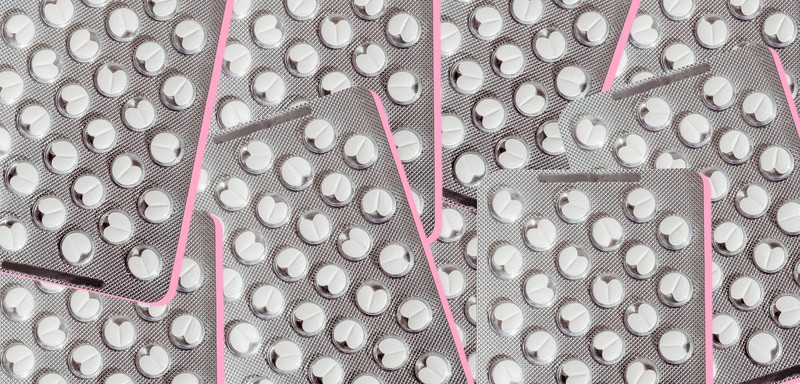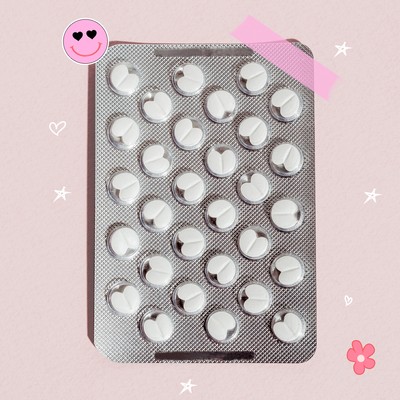

What You Need To Know About The Pill
The Pill Prevents Ovulation
The hormones in the pill – sometimes oestrogen and progesterone, sometimes just progesterone – stop your eggs from leaving your ovaries. No eggs leaving your ovaries means no opportunities for sperm to be fertilised, which prevents you from getting pregnant. “The pill contains synthetic hormones, which inhibits your body from producing hormones naturally and supresses ovulation,” says Francesca Lyon, director of nutrition at Future Woman. “What the oral contraceptive pill does is shut down the communication pathway from the brain to the ovaries. This in turn stops the ovaries from being instructed to produce oestrogen, ultimately preventing pregnancy. When taken correctly, it’s 99% effective.”
There Are Two Main Types
When we talk about the pill, people are typically talking about the combination pill. “The combined pill contains two synthetic hormones – oestrogen and progestin,” adds Sarah Welsh, co-founder of Hanx. “There are hundreds of different types of combined oral contraceptive pills, some with slightly higher doses of hormones than others, and some with slight variations on the synthetic types of oestrogen and progestin. Whichever you choose, they all prevent ovulation, thicken mucus at the neck of the womb, making it trickier for sperm to enter and reach an egg, and thin the lining of the womb, so even if an egg were to be fertilised, there would be a low chance of it implanting into the womb lining and being able to grow.” If you’re sensitive to oestrogen, your GP may suggest progesterone-only pills (sometimes called the mini pill). “If you go to your GP and ask to be on the pill, they’re likely to prescribe a combined pill such as Microgynon 30,” says Dr Deborah Lee from Dr Fox Online Pharmacy. “This is because it’s a reliable contraceptive, and even if you miss a few pills mid-pack, you are unlikely to become pregnant; it’s easier to take (you have 24 hours to take it, unlike some progesterone-only pills, which need to be taken at the same time); and gives more predictable bleeding patterns.”
Your GP Can Help You Make A Decision
If you want to go on the pill, book an appointment with your GP. “They should take a thorough history of your health and understand your wants and needs from a pill before prescribing it,” says Sarah. “For example, they should consider your menstrual cycle – i.e. whether you need a pill to help with heavy periods as well as contraception, or if you have an irregular cycle, your past medical history, such as being prone to acne, as well as your lifestyle and what will be most suitable for you. One of the most important things your GP will assess is your suitability to having oestrogen, and therefore if you’re eligible for the combined pill or not. This will include discussing your medical history, blood pressure and BMI. However, your GP may, understandably, look to save the NHS money by prescribing a cheaper pill, which may have side effects. It’s impossible to know which exact pill is right for you, which is why it’s important to engage with your own medical journey. Take the time to understand the various pill types and reported uses as well as side effects.”
The Pill Can Help With Unruly Periods
Over and above providing excellent contraception, the combined pill can be useful if you struggle with heavy, painful periods, continues Deborah. “As the pill thins the endometrium, there’s less tissue to be shed, and it also reduces period pain. It can also provide relief from endometriosis and PCOS and improves acne by reducing the secretion of androgens.”
A Withdrawal Bleed Isn’t A Real Period
When the pill was first invented, it was packaged as three weeks of pills followed by a seven-day break to give a monthly withdrawal bleed because women tend to find a period a reassuring physical sign they aren’t pregnant. “However, your ‘period’ on the pill isn’t a real period,” says Francesca. “You only bleed on the pill because certain hormones have been withdrawn.” Research now shows continuous pill taking is safe and effective. You can run packs together and take a seven-day break when you start to bleed.
It's Easy To Start
Taking your first pill on the first day of your period will ensure you’re starting it when you aren’t pregnant and will also mean the pill is effective immediately. As long as you start your pill at any time on days one to five of your cycle (day one is the first day of bleeding), you can assume the pill will work immediately. “If you start on day six or beyond, it will take seven days to be effective, so you’ll need to abstain from sex or use a condom until you have taken seven pills correctly,” Deborah continues. “Assuming you have been prescribed Microgynon 30, or a similar pill, choose a time of day to take it. For most women, this is first thing in the morning. Try to take it at the same time every day – say, 7am – but if you have a lie-in on the weekend, you can take your pill at lunchtime, and this isn’t a problem. If your pill is more than 24 hours late, this is a forgotten pill. Take it as soon as you remember and take the next pill on time. If you miss two or more pills, you may need emergency contraception.”
Side Effects Can Happen
Like any form of contraception, the pill comes with some side effects. The most common – spotting, breast tenderness, nausea, vomiting and bloating, usually stop after the first couple of months. “However, signs that the pill aren’t agreeing with you include headaches and migraines, hair loss, weight change, mood changes, depression, acne, irritability and a decreased sex drive,” adds Francesca. “Synthetic hormones don’t act in the same way, which can upset the body,” she says. Chat to your GP if your side effects haven’t settled within a couple of months, says Deborah. “Your GP will be able to work out whether side effects are related to oestrogen or progesterone (for example, spotting tends to come down to progesterone). If you have acne or irregular bleeding on Microgynon 30, this could be due to the progesterone in the pill, levonorgestrel. You may be swapped, for example, to Marvelon or Femodene which contain the progesterone, desogestrel and gestodene, respectively, but have the same 30mcg oestrogen dose.”
You Can Stop Taking It At Any Point
Just keep in mind that if you want to prevent pregnancy, you should start using a barrier method, like condoms, immediately post-pill. “For some women, it takes three months for their natural cycles to resume,” says Francesca. “But for other women it can take up to 12 months. To get your periods back, your body needs to re-establish the communication pathway from the brain to the ovaries. If you’ve been on the pill for a while, this can take time. If you haven’t got your period back within three months, chat to your GP or a health practitioner who can help with hormone testing, nutrition and supplementation – all of which can make a real difference. This is especially important if you originally went on the pill for irregular, heavy or painful periods.” Ultimately, remember your cycle will revert to how it was before you started taking the pill.
For more information head to Future-Woman.com & DoctorFox.co.uk. You can also buy oral contraceptives online at HanxOfficial.com.
DISCLAIMER: Features published by SheerLuxe are not intended to treat, diagnose, cure or prevent any disease. Always seek the advice of your GP or another qualified healthcare provider for any questions you have regarding a medical condition, and before undertaking any diet, exercise or other health-related programme.
DISCLAIMER: We endeavour to always credit the correct original source of every image we use. If you think a credit may be incorrect, please contact us at info@sheerluxe.com.

